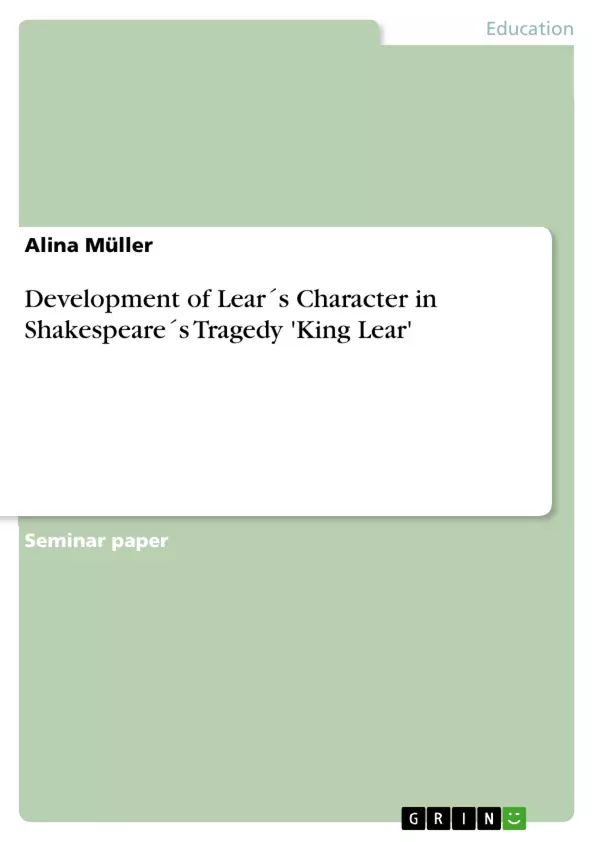The tragedy of King Lear, written by William Shakespeare in the seventeenth century, comprises a lot of informative topics that are still relevant today. For example, Foakes is fascinated by the diversity of the play’s themes saying, “[i]t is unsparing in its depiction of human cruelty and misery, but also rich in its portrayals of goodness, devotion, loyalty and self-sacrifice” (1). He adds that “…its language and its imagery, have encountered many to see the play in terms of universal values, as a kind of objective correlative for the spiritual journey through [the] life of [the] suffering Man” (Foakes 1997, 1). Foakes is insisting that the main plot and the sub-plot of the tragic heroes, known as Lear and Gloucester, are worth considering because both comprise many tragic events. First of all, the main plot for the character, Lear, should be regarded because it seems to be more tragic and complex. Reading the tragedy, it becomes obvious that Lear, throughout the play, undergoes a gradual development of his identity. The way he experiences this change is important to follow, because it gives the readers a better insight into his changing personality.
First, Lear´s true identity will be represented in this paper through the abdication scene and banishment of Cordelia: “[t]he proud and egotistical king of the first scene, who cannot tell the difference between love and flattery…” (Green 1992, 171) unfairly divides his kingdom between his three daughters. Secondly, Lear´s wandering in search of self will be shown after being dishonoured by his ungrateful daughters in the storm scene. After losing his power, his daughters, and his house, Lear begins to lose his mind, and in trying to find the reason of his suffering becomes mad. Finally, Lear´s ripeness will be introduced after his meeting with Gloucester and reconciliation with Cordelia. Now Lear gets a new insight into himself, finds an answer to his madness, repents, and reveals himself to his banished daughter. So, this paper will show that insensible Lear, who values his authority above all, learns to understand the true feelings and to be human only after going through the grievous journey from the loss of his status as king, through his sufferings, to self-knowledge and self-revelation. A more precise understanding of these subjects will be introduced in the next pages.
Inhaltsverzeichnis (Table of Contents)
- Introduction
- Foolishness and Weakness of the Old King
- Oncoming Insanity
- Suffering of Lear
- Lear's Self-Revelation
- Conclusion
Zielsetzung und Themenschwerpunkte (Objectives and Key Themes)
This paper examines the development of King Lear's character throughout Shakespeare's tragedy, exploring his transformation from a powerful and seemingly wise king to a broken and tormented figure. Through analyzing his actions and motivations, the paper aims to provide insight into Lear's journey of self-discovery and the tragic consequences of his flaws.
- Lear's initial foolishness and weakness
- The impact of his daughters' betrayal on his mental state
- The suffering he endures as a result of his actions
- Lear's self-revelation and journey to self-knowledge
- The consequences of Lear's actions on his family and kingdom
Zusammenfassung der Kapitel (Chapter Summaries)
The first chapter introduces the tragedy of King Lear and its relevance to contemporary themes, highlighting the play's portrayal of human cruelty and misery alongside themes of goodness and devotion. The chapter focuses on Lear's early character traits, particularly his initial arrogance and egotism, which lead him to make decisions that ultimately contribute to his downfall. The love test administered by Lear to his daughters reveals his psychological weakness and dependence on flattery, culminating in the rejection of Cordelia and the beginning of his tragic journey.
The second chapter delves further into Lear's initial foolishness and weakness, highlighting the impact of his decision to divide his kingdom and his inability to discern true love from flattery. Lear's early actions are analyzed in detail, illustrating how they set the stage for his subsequent downfall. The chapter emphasizes how Lear's misguided judgment and pride ultimately lead to the tragic consequences that unfold throughout the play.
Schlüsselwörter (Keywords)
The main keywords and focus topics of this paper include: King Lear, Shakespearean tragedy, character development, foolishness, weakness, betrayal, suffering, self-revelation, self-knowledge, power, authority, family, love, justice, and redemption.
- Quote paper
- Alina Müller (Author), 2011, Development of Lear´s Character in Shakespeare´s Tragedy 'King Lear', Munich, GRIN Verlag, https://www.grin.com/document/182420



